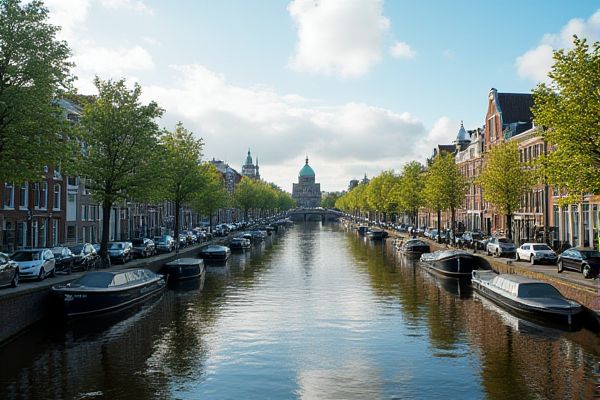
Housing market and best cities to live in Netherlands: Balanced housing market dynamics. Stable property appreciation rates. Low property taxation policies. Dense public transportation networks. Energy-efficient housing initiatives. Strong rental market presence. Amsterdam's vibrant cultural attractions. Rotterdam's modern architecture landscape. Utrecht's historical charm and academia. Eindhoven's technological innovation hub.
Balanced housing market dynamics.
The Dutch housing market is showing signs of stabilization and growth, with house prices increasing consecutively over the last few months, driven by sustained nominal wage growth, limited supply of new builds, and stable mortgage rates. Major cities like Amsterdam, The Hague, Utrecht, and Rotterdam exhibit stronger house price rises and tighter market conditions compared to the rest of the Netherlands, but face unique challenges such as high demand, limited space, and regulatory hurdles. For further insight into these trends, you can explore the Dynamic Credit Quarterly Update which provides a comprehensive overview of the market conditions in Q3 2023.
Stable property appreciation rates.
The Netherlands' housing market is showing stable property appreciation rates, with apartment prices rising by 5.1% and terraced house prices by 5.4% year-over-year in Q1 2024, following a slight decline in 2023. Cities like Amsterdam, The Hague, and Rotterdam are experiencing significant growth, with The Hague offering particularly attractive rental yields and a lower cost of living compared to Amsterdam and Rotterdam.
Low property taxation policies.
In the Netherlands, housing is favorably taxed, with owner-occupied homes subject to taxation in Box 1 of the Dutch income tax code, where taxes paid on imputed rent are often offset by tax deductions for mortgage interest, making housing more advantageously taxed than other forms of savings or investment.
Dense public transportation networks.
The Netherlands boasts a highly effective and dense public transport network, including trains, buses, trams, metro systems, and ferries, making it easy and comfortable to travel between cities and within urban areas, with modern amenities and sustainable options. This extensive network, detailed further on the Public Transport In The Netherlands page, offers convenience for both locals and visitors. Meanwhile, the housing market is experiencing a recovery with rising house prices and increased transactions, driven by factors like reduced mortgage rates and wage growth, despite a limited housing inventory.
Energy-efficient housing initiatives.
The Netherlands is witnessing a significant push towards energy-efficient housing, with initiatives like the renovation of homes using insulated materials, solar panels, and heat pumps, particularly notable in projects such as Bloemendal Bouw's renovation in Leusden, which aims to reduce energy consumption and align with the country's goal of zero gas usage by 2050. For further insights into these initiatives, visit the Energy Efficient Housing In The Netherlands section on their website.
Strong rental market presence.
The Netherlands has several cities with a strong rental market presence, including Amsterdam, known for its high rental demand and stable returns; Rotterdam, which attracts a young and diverse crowd with lower property prices and strong growth potential; Utrecht, popular with commuters, students, and professionals due to its central location and vibrant culture; and Eindhoven, a tech hub with high rental demand driven by its innovative and international population.
Amsterdam's vibrant cultural attractions.
Amsterdam, known as the "Venice of the North," offers a vibrant cultural scene with attractions like the Rijksmuseum, Van Gogh Museum, and the historic canals, making it a top choice for those interested in art, history, and a dynamic urban lifestyle. However, its high real estate prices and tourist influx can make the city centre less affordable for residents. For more detailed information about the city's offerings and its challenges, you can explore the comprehensive entry on Wikipedia.
Rotterdam's modern architecture landscape.
Rotterdam is distinguished by its modern architecture landscape, resulting from the near-complete destruction of its city center during World War II, and now features notable structures like the cube houses, the Euromast, the Erasmusbrug, and the Kunsthal, designed by renowned architects such as Rem Koolhaas and Piet Blom.
Utrecht's historical charm and academia.
Utrecht is renowned for its historical charm and academic excellence, blending medieval roots with 21st-century science, and is home to a lively university town with a rich cultural history, vibrant canals, and a diverse international community. The city's dynamic environment offers a unique blend of ancient architecture complemented by innovative advancements, making it a perfect place for both history enthusiasts and modern urban dwellers. For more information, explore the Utrecht International Center website to discover why so many people are captivated by this picturesque university town.
Eindhoven's technological innovation hub.
Eindhoven, known for its technological innovation hub, is part of a broader Dutch housing market that is experiencing a rebound, with house prices expected to grow in the coming years. Factors such as reduced mortgage rates and wage growth contribute to this positive trend, making it an attractive time for buyers despite the competitive market conditions. For more insights on the dynamics influencing this recovery and future prospects, you can visit the Dutch Housing Market report. Ascending prices are anticipated to rise by 4% in 2024 and 3.5% in 2025, positioning the market as a burgeoning opportunity for investors and homeowners alike.
